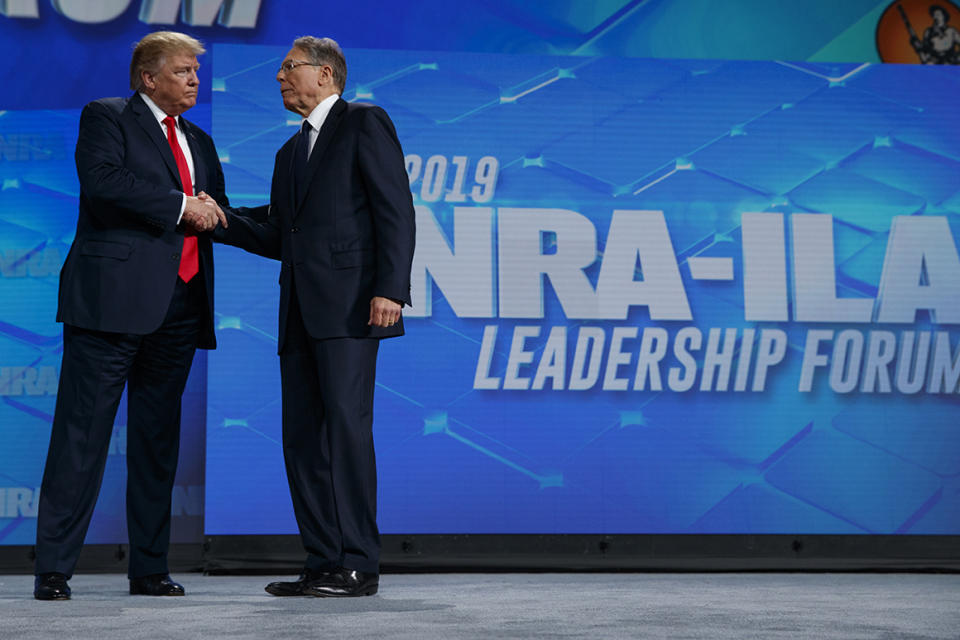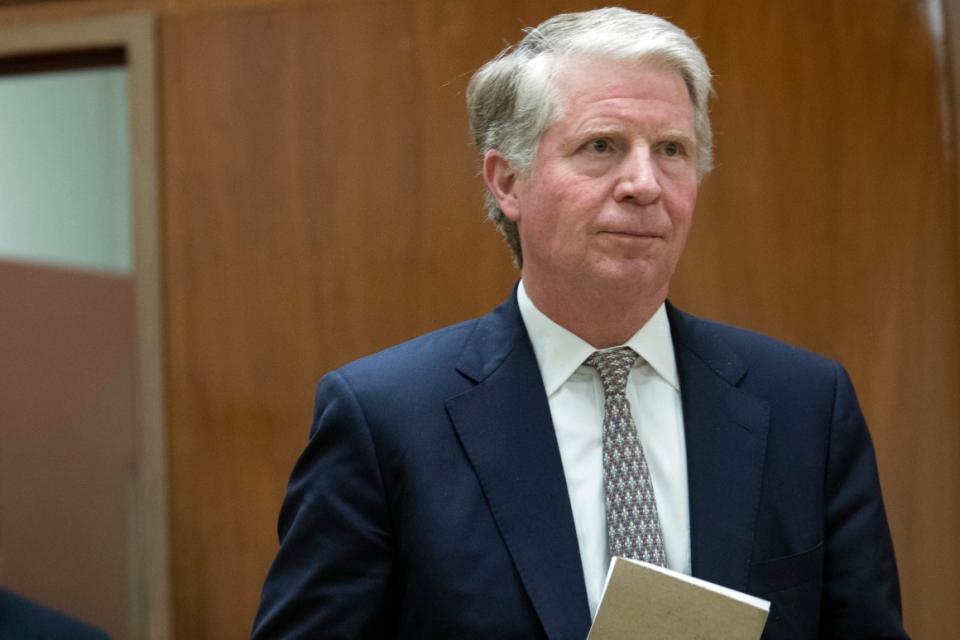Will New York slap Trump with an October surprise?
This November, New York might be a swing state. Not because it will be remotely suspenseful — Democrats have waltzed away with its electoral votes in every presidential contest from 1988 on — but because a barrage of legal activity coming out of the Empire State could provide a few plot twists heading into the presidential election in November.
“Could” is the operative word there. The thing about plot twists is that you can’t put them on your calendar beforehand.
But people and entities close to Trump World have found themselves wrapped up in a host of New York legal matters, and they could factor into the way the presidential contest plays out. Manhattan’s district attorney, Cy Vance, just notched a major Supreme Court victory in his effort to scrutinize Trump’s financial dealings. Meanwhile, New York’s attorney general has sued to dissolve one of Trump’s strongest outside allies. And despite resistance from Washington, a former career prosecutor recently ascended to the top of the U.S. Attorney’s Office for the Southern District of New York — meaning the most powerful law enforcement job in DOJ’s most powerful district isn’t held by an ally of the Trump administration.
The NRA vs. The World
Last week, New York Attorney General Letitia James brought a blockbuster civil lawsuit against the National Rifle Association, accusing it of a host of financial wrongdoings and seeking its dissolution. The NRA has long been a stalwart ally of the Republican Party, and it spent millions to help Trump win in 2016.
Her office floated a major national announcement the day before, spurring speculation that she was going to target a company or person linked to the Trumps. But zeroing in on the NRA was the culmination of a long-running probe that has generated simmering consternation among allies of the gun group, who point out that James hasn’t been understated about her views on the subject.
“The NRA holds [itself] out as a charitable organization, but in fact, [it] really [is] a terrorist organization,” she said in a 2018 interview with Ebony.
Many of the allegations in the 100-plus-page suit, including that the NRA’s CEO used the organization’s funds to fly his family members around on private jets, had trickled out in media reports over the past year. But James’ lawsuit gave those concerns the imprimatur of law enforcement, and the suit cites NRA CEO Wayne LaPierre himself.
It’s extremely unlikely the litigation will be resolved before the election, and the NRA has countersued, calling the state’s suit a political attack (the NRA’s president called it “a power grab by a political opportunist — a desperate move that is part of a rank political vendetta”). But the suit could have a big impact on November — the only question is how.
Multiple people close to the NRA spoke to POLITICO about how the suit will affect the group. Two things are all but certain: First, it will excite NRA supporters and likely drive an increase in membership. And second, It will be expensive. Sources said the group’s mounting legal costs could siphon off money that would have gone to TV ads designed to get those new members to the polls. So the New York lawsuit could clarify which matters more: the legions of voters motivated by perceived assaults on gun rights, or the more formal power of the biggest group that lobbies for them.
Since Trump’s election, the NRA has faced a host of financial problems, including some pretty big ones that insiders have long said are self-inflicted. In particular, the group’s spending on legal bills since Trump’s election may have eclipsed how much it spent helping Trump win that race; a legal filing from its former PR firm alleged in April that the gun group’s top lawyer had billed it $54 million, as The Trace reported. And its pricey legal fights haven’t subsided, indicating its legal spending since then has likely only grown.
Meanwhile, the NRA’s spending on elections has sagged.
“They were a nonfactor in 2018,” one person close to the gun group told POLITICO. “They’re going to be an even bigger nonfactor in 2020, financially.”
In 2016, the group spent more than $50 million to help Republicans. In 2018, per OpenSecrets, the NRA just spent just $9.5 million on federal elections. And thus far for 2020, the group’s spending doesn’t look impressive. In June 2016, the NRA spent more than $5 million. This past June, however, the NRA has so far only reported spending $2 million, according to Federal Election Commission records. A recent filing shows it spent $530,000 in August on canvassing to support Trump. Meanwhile, the group has laid off dozens of employees.
Despite all that, the group’s leadership is looking to telegraph optimism. In an interview with the Washington Free Beacon, a top NRA official said the group will spend “tens of millions” in the fall and has added a thousand new members every day since June. Assuming those numbers are right, the association has likely pulled in about $3 million in new membership dues (its website says annual membership fees are $45) thus far this summer.
And another challenge could be maintaining the confidence of major donors. The association is arguing that the allegations in James’ lawsuit are fanciful, and that the private jets and yacht trips were for the good for the NRA. It’s an open question as to whether that defense will persuade the group’s major donors to keep giving.
For the group’s opponents, this all brings considerable schadenfreude.
"Simply put, the NRA is going to be spending less on politics this cycle and more on lawyers, and that's going to make us all safer,” said John Feinblatt, president of Everytown for Gun Safety, which pushes for stricter gun laws.

The Southern District’s Black Box
The Justice Department has a “general practice” — according to its inspector general — of avoiding bringing criminal charges against political candidates within 60 days of an election. That practice also generally proscribes “public disclosures of investigative steps related to electoral matters.” If DOJ abides by that practice, the department has less than a month to bring charges that could be connected to either presidential contender.
Attorney General William Barr issued a memo early this year ordering prosecutors and investigators to get his personal signoff on any probes into presidential candidates. “The scope of this memorandum should be broadly construed to ensure that Department leadership is made aware of the opening of matters that could potentially be disruptive to our democratic processes if publicly disclosed prior to an election,” Barr wrote.
Given the public excoriation the department faced for its eleventh-hour revelations in 2016 about Hillary Clinton’s emails, any announcement of criminal charges against major figures in the days before Election Day 2020 seems unlikely. Barr has downplayed expectations for such prosecutions, but seems to be leaving open the possibility of the preelection release of a report from U.S. Attorney John Durham’s long-running investigation into the genesis of special counsel Robert Mueller’s Russia probe.
Republicans have been champing at the bit for revelations from Durham’s inquiry. But, as NPR detailed, Barr’s assurance that he’ll abide by DOJ’s longstanding policy hasn’t done much to calm Democrats’ nerves.
Simultaneously, the Southern District of New York has been scrutinizing Rudy Giuliani — who has represented both Trump and his campaign — in connection with potential violations of foreign lobbying laws. It’s not clear whether Barr, known to be no fan of Giuliani, would deem a prosecution of the president’s attorney to fall afoul of his memo.
The Advance of Cy Vance
New York District Attorney Cy Vance nabbed a win at the Supreme Court last month in his quest for financial information about Trump and his businesses. While Vance’s legal demand for Trump’s tax and financial information proceeded for months in tandem with litigation over congressional subpoenas, the high court’s decisions on those cases last month left the Manhattan prosecutor — a Democrat who was elected to his post in 2010 — much closer to the finish line in his fight than Congress has managed to get.
The Supreme Court’s decision on the House subpoenas at issue punted those cases back to lower courts for further review. The justices told those judges to take a close look at lawmakers’ need for the information and whether the scope of the Hill’s demands aligned with legitimate congressional goals. The House may well be able to persuade judges to enforce the subpoenas, at least in part, but with less than three months until Election Day, the prospects that Congress scores substantial Trump-related revelations looks slim.
The DA’s probe initially appeared to focus on hush money payments made to women who said they had sexual encounters with Trump, but recent filings have suggested it is a wider investigation into potentially serious criminal misconduct.
The investigation includes allegations of bank and insurance fraud, according to a filing last week. Trump’s latest attempt to block the subpoena “fails for the additional reason that it rests on the false premise that the grand jury’s investigation is limited to so-called 'hush-money' payments made by Michael Cohen on behalf of Plaintiff in 2016,” Vance wrote in those court papers. “This Court is already aware that this assertion is fatally undermined by undisputed information in the public record.”

Congressional investigators and Vance’s prosecutors believe the Trump financial data could provide a treasure trove of evidence about potential bank fraud and tax fraud. Former Trump personal lawyer Michael Cohen has said Trump had a pattern of overstating the value of his assets when applying for loans and understating the worth of those same properties for tax purposes.
While it’s possible that federal prosecutors in New York probing Giuliani and his associates could make news before the election, the window on that possibility is closing. But those norms on preelection law enforcement action don’t constrain state and local officials. And a spokesperson for Vance confirmed to POLITICO that his office does not have any comparable 60-day blackout period for moves that could potentially shape elections. So an October surprise from those quarters is a more viable prospect.
Trump officially dropped New York as his residence last October, but local prosecutors there would have jurisdiction over his tax filings, bank submissions, and business records since the Trump Organization remains in the city and Trump himself lived there for his entire life before the shift to Florida last fall.
Vance’s office has already shown a willingness to bring aggressive criminal charges against Trump associates. In March of last year, the D.A. announced an indictment of former Trump campaign chairman Paul Manafort on 16 charges of fraud and falsifying business records. The move seemed to be aimed at discouraging a Trump pardon of Manafort on his federal convictions.
A judge tossed out the New York-based Manafort case, finding that it violated a New York State law against successive state and federal prosecutions for the same crimes. Vance’s appeal of that ruling is pending.
Meanwhile, Vance and James have both sought information on Trump from Deutsche Bank, the longtime lender of choice to the president’s businesses.
Josh Gerstein and Erin Durkin contributed to this report.
